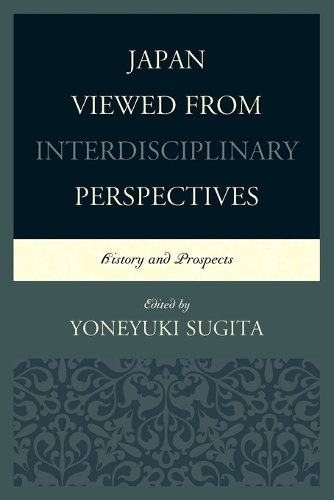
Japan Viewed from Interdisciplinary Perspectives: History and Prospects
(Paperback)
Available Formats
Publishing Details
Japan Viewed from Interdisciplinary Perspectives: History and Prospects
By (Author) Yoneyuki Sugita
Contributions by Bruce Cumings
Contributions by Karl Gustafsson
Contributions by Steven Heine
Contributions by Toru Oga
Contributions by Yuki Ooi
Contributions by Nissim Otmazgin
Contributions by John Paden
Contributions by Juha Saunavaara
Contributions by Mayako Shimamoto
Bloomsbury Publishing PLC
Lexington Books
11th September 2017
United States
Classifications
Professional and Scholarly
Non Fiction
Asian history
Globalization
327.52
Physical Properties
Paperback
320
Width 150mm, Height 228mm, Spine 23mm
463g
Description
The growth rate of the Gross Domestic Product (GDP) in the Asia-Pacific region greatly surpasses the world average. When the Trans-Pacific Partnership (TPP) is better realized, then the worlds largest free trade zone will be firmly established. It seems that this region has a very rosy outlook indeed; however, this region also faces a large number of serious problems such as: atomic energy in Japan, conflicts about East Asian regional integration, the decline of the Japanese Official Development Assistance (ODA), and the TPPs possible impact on the Japanese universal health insurance system. We now face a possible Sino-Japanese military conflict concerning the Senkaku Islands (or Diaoyutai Islands). In short, the Asia-Pacific region has both a rosy future and the potential influence from unstable and dangerous elements at work within the region at present. The main purpose of this book is to analyze historical development, whilst looking at the contemporary situation of Japan from interdisciplinary perspectives. This book asks three major questions: (1) Is this really globalization (2) What are Japans relations with other Asian countries (3) Do U.S.-Japan relations still matter Fourteen leading scholars in their fields answer these questions from interdisciplinary perspectives.
Reviews
This collection of fourteen essays under three main themesglobalization, JapanAsia relations and USJapan relationswill appeal to both scholars and students of Japanese studies. Yoneyuki Sugita deserves accolades for putting together this excellent volume that throws new light on some of Japans key historical and contemporary issues. * Japan Today *
This collection of fourteen essays under three main themesglobalization, Japan-Asia relations and US-Japan relationswill appeal to both scholars and students of Japanese studies. Yoneyuki Sugita deserves accolades for putting together this excellent volume that throws new light on some of Japans key historical and contemporary issues. -- Purnendra Jain, University of Adelaide
This conference collection analyses, from a great variety of issues, Japan`s self-identities and its interactions with the outside world. It gives interesting insights into how globalization has been affecting Japan and its partners. The book shows that Japan is not only a passive recipient but also active actor in this process. This collection is of great interest to all who want to know more about the political, economic and cultural aspects of globalization and about Japan's foreign policy in general! -- Reinhard Drifte, Newcastle University
The year 2015 marks the seventieth anniversary of the end of World War II. Accolades to Yoneyuki Sugita who took this event as an opportunity to gather experts from all over the world to discuss prospects and serious problems of the Asia-Pacific region. Japan Viewed from Interdisciplinary Perspectives: History and Prospects is a refreshing interdisciplinary book that reviews Japans past seventy years from various scientific and cultural perspectives. A highly thought-provoking book that contains a wealth of information on the meaning of globalization, Japans foreign relations, and the significance of the US-Japan relationship. It is a precious contribution to our understanding of Japans standing in the region. -- Carmen Schmidt, University of Osnabrueck
The central theme of this collection of essays is that Japans niche in the global context isor at least could befar more secure than either domestic or international rhetoric suggests. Using both historical and contemporary data, the authors cogently argue that if the Japanese government, Japanese society, and their American and Chinese counterparts all focused on their true economic, strategic, and cultural interests, the major problems of the Asia-Pacific region would be manageable. In addition to advocating for tempering rhetoric, the essays compiled here also identify institutional flexibility and attention to cultural practices, such as enjoying manga and pursuing Buddhist prayer that serve to reduce cultural anxieties in a rapidly globalizing world. -- Laura Hein, Northwestern University
In this study, political scientists, Japanologists and upcoming scholars have produced a firmly-interconnected mosaic work on Japan and her relations with the US and Asian nations. These essays shed light on the wide spectrum of issues, including economic migration, tourism, race, identity, anti-Japanism, popular culture, Buddhism, health-promotion policy, political purges, atomic power generation (the best documented), trade dispute settlement, maritime security operation, schooling, and ODA support for education rather than trade. The contributors offer various ways of considering relations with China in a region without strong institutional settings as in Europe. -- Aiko Ikeo, Waseda University
Author Bio
Yoneyuki Sugita is professor of history at Osaka University.
